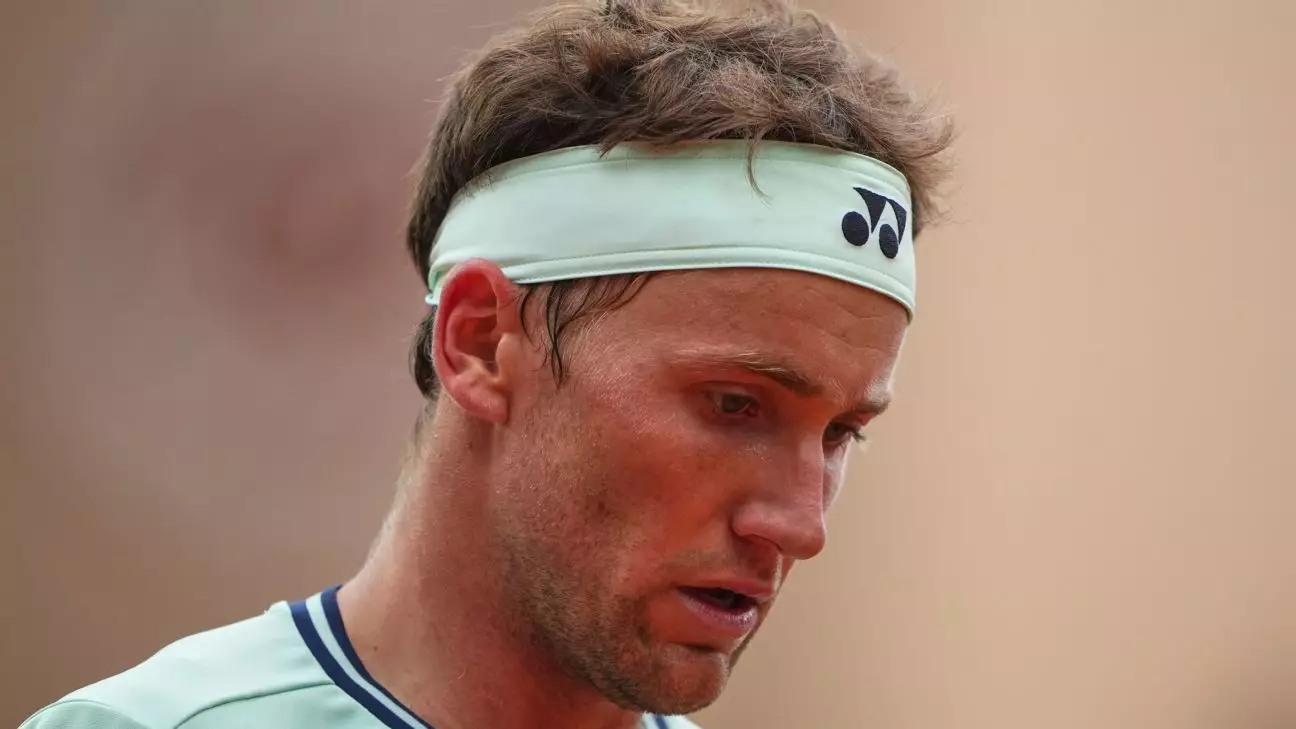In a dramatic second round at Roland Garros, two-time finalist Casper Ruud faced an unexpected and crushing defeat against Nuno Borges, marking a stark contrast to his previous performances at this prestigious tournament. The seventh-seed, usually synonymous with grit and determination, struggled under the weight of persistent pain in his left knee, a shadow of the player who reached at least the semifinals in his last three appearances. The fact that Ruud had dropped 13 of the last 14 games of the match not only reflects his physical limitations but also raises questions about his mental state during high-pressure scenarios.
The French Open, often seen as a stage where players can showcase their resilience against adversity, revealed a more poignant side of Ruud. While some might argue that every competitor battles against physical woes, the visible struggle of Ruud is a reminder that even elite athletes are human, subject to frailty and injury. In his post-match comments, Ruud echoed sentiments of disappointment, highlighting how certain movements—especially his open-stance backhand—were particularly excruciating. It’s haunting to consider how a once-dominant shot had become a source of pain, sculpting the course of his match and perhaps his mental approach to the remainder of the tournament.
Rising Stars and Shifting Fortunes
In stark contrast, defending champion Carlos Alcaraz showcased a starkly different narrative, overcoming a momentary blip in performance to secure a win against Fabian Marozsan. While Alcaraz stumbled slightly in the second set, his overall composure speaks volumes about his evolving trajectory in the sport. This duality of experience between Ruud and Alcaraz offers fascinating insights into the psychology of tennis: the pressure to perform at the highest levels can warp one’s understanding of self and capacity. For Alcaraz, moments of adversity appear as stepping stones, while for Ruud, they manifest as stumbling blocks.
The youthful dynamism of Alcaraz, a mere 22 years old, adds layers to a tournament narrative ripe with ambition and stakes. This resilience is not just a reflection of his skill but also of a mindset that has emerged from overcoming early career challenges. He noted, “In the second set, he started to play much better and he was really aggressive,” which underscores a critical element of sports psychology: the ability to mentally reset after adversity. This is something Ruud, caught in a cycle of pain and frustration, may be struggling to grasp.
The Pursuit of Victory Amid Heartbreak
One cannot help but ponder how much Ruud’s physical limitations have overshadowed his potential. Having recently triumphed at the Madrid Open, he now finds himself at a crossroads, where his body seems to betray the ambitions of his mind. The tennis world often idolizes the pursuit of victory, yet Ruud’s situation exposes a more profound struggle—that of managing pain while striving for greatness.
As Ruud prepares for medical examinations to address his continuing discomfort, fans are left questioning the future trajectory of a player once regarded as a formidable challenger. His story pushes the boundaries of our understanding of athletic excellence; it compels us to confront the fragility of even the most elite professionals in their respective domains.
Moreover, the upcoming World Tennis Tour will undoubtedly notice the ripple effects of Ruud’s defeat far beyond this tournament. The 2023 US Open finalist spoke openly about his struggles, ultimately shedding light on the physical and psychological battles that shape the careers of elite athletes.
A Tournament of Uncertainties
As the competition at Roland Garros progresses, the evolution of rising stars like Lorenzo Musetti and the reliable steadiness of veterans like Alcaraz create an exciting tableau of possibilities. Musetti’s straightforward victory against Daniel Galan reinforces that moments of resilience are borne out of consistent performances—coupled with a ruthless drive to succeed.
Each match in a Grand Slam is a reflection of countless hours of training, mental fortitude, and a bit of luck. For the champions, the stakes elevate with every round, while for spirited competitors like Ruud, every setback becomes part of a larger narrative that speaks to the complexities of athletic competition.
As the tournament continues, the results hinge on a myriad of external and internal factors, making every victory, every loss, and every injury a compelling element of the ongoing saga that is professional tennis. This relentless cycle of triumph and despair is what keeps audiences riveted, waiting to see just how high they can soar and how low they can fall.


Leave a Reply